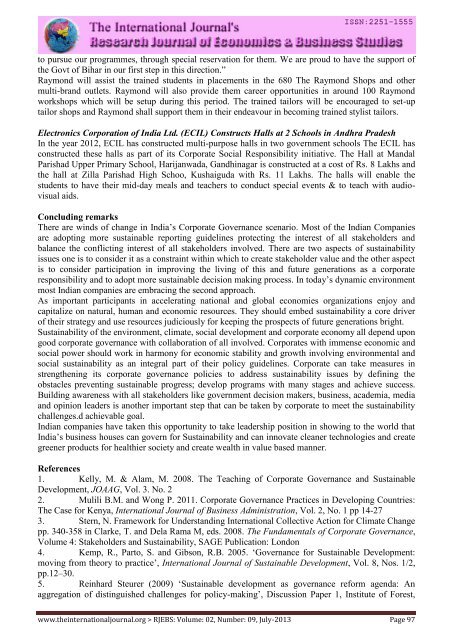Research Journal of Economics & Business Studies - RJEBS - The ...
Research Journal of Economics & Business Studies - RJEBS - The ...
Research Journal of Economics & Business Studies - RJEBS - The ...
Create successful ePaper yourself
Turn your PDF publications into a flip-book with our unique Google optimized e-Paper software.
to pursue our programmes, through special reservation for them. We are proud to have the support <strong>of</strong><br />
the Govt <strong>of</strong> Bihar in our first step in this direction.”<br />
Raymond will assist the trained students in placements in the 680 <strong>The</strong> Raymond Shops and other<br />
multi-brand outlets. Raymond will also provide them career opportunities in around 100 Raymond<br />
workshops which will be setup during this period. <strong>The</strong> trained tailors will be encouraged to set-up<br />
tailor shops and Raymond shall support them in their endeavour in becoming trained stylist tailors.<br />
Electronics Corporation <strong>of</strong> India Ltd. (ECIL) Constructs Halls at 2 Schools in Andhra Pradesh<br />
In the year 2012, ECIL has constructed multi-purpose halls in two government schools <strong>The</strong> ECIL has<br />
constructed these halls as part <strong>of</strong> its Corporate Social Responsibility initiative. <strong>The</strong> Hall at Mandal<br />
Parishad Upper Primary School, Harijanwada, Gandhinagar is constructed at a cost <strong>of</strong> Rs. 8 Lakhs and<br />
the hall at Zilla Parishad High Schoo, Kushaiguda with Rs. 11 Lakhs. <strong>The</strong> halls will enable the<br />
students to have their mid-day meals and teachers to conduct special events & to teach with audiovisual<br />
aids.<br />
Concluding remarks<br />
<strong>The</strong>re are winds <strong>of</strong> change in India’s Corporate Governance scenario. Most <strong>of</strong> the Indian Companies<br />
are adopting more sustainable reporting guidelines protecting the interest <strong>of</strong> all stakeholders and<br />
balance the conflicting interest <strong>of</strong> all stakeholders involved. <strong>The</strong>re are two aspects <strong>of</strong> sustainability<br />
issues one is to consider it as a constraint within which to create stakeholder value and the other aspect<br />
is to consider participation in improving the living <strong>of</strong> this and future generations as a corporate<br />
responsibility and to adopt more sustainable decision making process. In today’s dynamic environment<br />
most Indian companies are embracing the second approach.<br />
As important participants in accelerating national and global economies organizations enjoy and<br />
capitalize on natural, human and economic resources. <strong>The</strong>y should embed sustainability a core driver<br />
<strong>of</strong> their strategy and use resources judiciously for keeping the prospects <strong>of</strong> future generations bright.<br />
Sustainability <strong>of</strong> the environment, climate, social development and corporate economy all depend upon<br />
good corporate governance with collaboration <strong>of</strong> all involved. Corporates with immense economic and<br />
social power should work in harmony for economic stability and growth involving environmental and<br />
social sustainability as an integral part <strong>of</strong> their policy guidelines. Corporate can take measures in<br />
strengthening its corporate governance policies to address sustainability issues by defining the<br />
obstacles preventing sustainable progress; develop programs with many stages and achieve success.<br />
Building awareness with all stakeholders like government decision makers, business, academia, media<br />
and opinion leaders is another important step that can be taken by corporate to meet the sustainability<br />
challenges.d achievable goal.<br />
Indian companies have taken this opportunity to take leadership position in showing to the world that<br />
India’s business houses can govern for Sustainability and can innovate cleaner technologies and create<br />
greener products for healthier society and create wealth in value based manner.<br />
References<br />
1. Kelly, M. & Alam, M. 2008. <strong>The</strong> Teaching <strong>of</strong> Corporate Governance and Sustainable<br />
Development, JOAAG, Vol. 3. No. 2<br />
2. Mulili B.M. and Wong P. 2011. Corporate Governance Practices in Developing Countries:<br />
<strong>The</strong> Case for Kenya, International <strong>Journal</strong> <strong>of</strong> <strong>Business</strong> Administration, Vol. 2, No. 1 pp 14-27<br />
3. Stern, N. Framework for Understanding International Collective Action for Climate Change<br />
pp. 340-358 in Clarke, T. and Dela Rama M, eds. 2008. <strong>The</strong> Fundamentals <strong>of</strong> Corporate Governance,<br />
Volume 4: Stakeholders and Sustainability, SAGE Publication: London<br />
4. Kemp, R., Parto, S. and Gibson, R.B. 2005. ‘Governance for Sustainable Development:<br />
moving from theory to practice’, International <strong>Journal</strong> <strong>of</strong> Sustainable Development, Vol. 8, Nos. 1/2,<br />
pp.12–30.<br />
5. Reinhard Steurer (2009) ‘Sustainable development as governance reform agenda: An<br />
aggregation <strong>of</strong> distinguished challenges for policy-making’, Discussion Paper 1, Institute <strong>of</strong> Forest,<br />
www.theinternationaljournal.org > <strong>RJEBS</strong>: Volume: 02, Number: 09, July-2013 Page 97
















